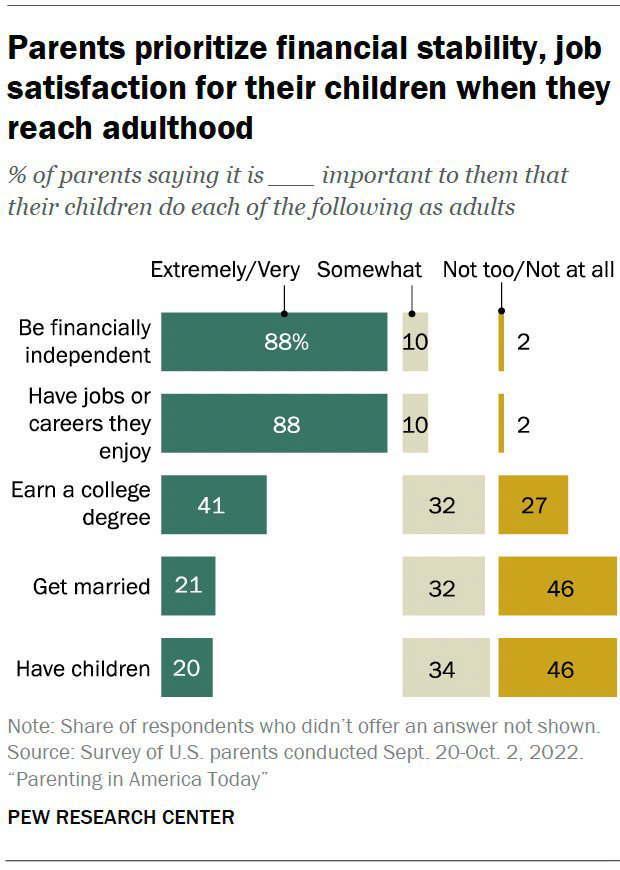American parents prioritize work and money far above marriage and parenthood for their children.
A Pew Research Center report asked 3,757 parents of children below the age of 18 about goals for their children.
Eighty-eight percent of parents thought an enjoyable career and financial independence was “very” or “extremely” important for their children, whereas only 21 percent thought getting married was important, and 20 percent believed having children was important.
“It should trouble all of us that only a minority of parents would also see marriage and family life as central goals, and even more so that nearly 50 percent would say that marriage and parenthood are basically unimportant,” University of Virginia sociologist Brad Wilcox and Institute for Family Studies editor Alysse ElHage wrote. [Emphasis in original].
"A large majority of American parents are prioritizing work & money for their children over marriage and parenthood."
That's a big mistake.
My latest w/ @AlysseElHage on latest @pewresearch:
https://t.co/XTfr5gmUri @Deseret— Brad Wilcox (@BradWilcoxIFS) February 3, 2023
Saying today’s parents are making a “big mistake,” Wilcox and ElHage argue, “All the money in the world won’t make up for the absence of family later in life.”
To Wilcox and ElHage, there are five cultural factors contributing to the dismal view of family.
One such factor is the overall decline in marriage: “It’s difficult to view getting married and having kids as beneficial life goals when you haven’t witnessed many good marriages yourself.”
It is a worldwide phenomenon that marriage rates are declining, and one contributing factor is the “delay in marriage” where the average age for a first marriage is 30 for men and 28 for women. In addition, 70 percent of couples cohabitate before marriage — a drastically increasing practice as 65 percent of couples believe cohabitating will increase their chances of having a lasting marriage, according to the writers.
The decline in marriage, and the importance placed on it, is also fueled by the breakdown in many marriages, with around 50 percent of adults having witnessed the dissolution of their own parents’ marriages.
This leads to an “anxiety about the prospect of divorce” that is scaring America’s young people away from marriage in the first place.
Pew report author Rachel Minkin told Wilcox and ElHage, “There are no significant differences by marital status for the shares of parents saying it is extremely or very important their children be financially independent, have jobs or careers they enjoy, earn a college degree, and have children as adults.”
Another cultural factor feeding the careerist view of modern parents is the idea that, while marriage and children are important, they should be afterthoughts in light of attaining a certain level of professional success and financial independence.
This view treats marriage as a “capstone” to success, rather than a foundational part of life and can lead to “the rejection of marriage altogether.”
“The advent of the capstone model of marriage means that more Americans see marriage as out of their reach, given the perceived economic and emotional requirements to get married nowadays,” Wilcox and others wrote separately.
Men and women also give enormous importance to success in a career as a source for satisfaction in life — a phenomenon described as “workism” — a mentality found to be “driving family formation down” globally.
When “workism” is a view adopted by parents, children receive the message that marriage is less important than money and professional success as sources of meaning and happiness in life.
“Too many people mistakenly view marriage and family as conflicting (or competing) with satisfying work and career success,” Wilcox and ElHage wrote.
“The No. 1 predictor of overall life satisfaction is marital quality,” they continued. However, even while that is the case, many parents are ignorant of the benefits of marriage and the “large body of research show[ing] that money and a career are not the keys to happiness.”
Having family and friends create social ties that “are better predictors than professional and financial success of our happiness and health over the course of life,” even above predictors like social class, intelligence quotient (IQ), and genetics. Such ties can also help “delay mental and physical decline.”
Cultural messaging received about marriage and parenthood, which Wilcox and ElHage describe as “corrosive,” is another factor in the modern view on marriage and family.
“Much of today’s popular culture tells us that marriage and children are an obstacle to individual happiness, that parents especially are unhappy, and that parenting is just too hard,” they wrote. “Yet research continues to show that married people are generally happier than unmarried people.”
While the Pew study reports respondents viewing their own parenthood as “the most or one of the most important aspects of who they are,” Wilcox and ElHage say that the “findings highlight the unsettling truth that too many parents today do not appreciate how much marriage and family matter to their own children’s future well-being.”
“Not only are they doing their sons and daughters a disservice, given the value of kith and kin for their own kids’ future sense of meaning and happiness, but they are also doing themselves a disservice,” they conclude. “Because in a world where marriage and fertility are cratering, they may find themselves in the final chapters of their lives with few or no grandchildren. And then, all the money in the world won’t make up for the absence of family ties across the generations.”
Breccan F. Thies is a reporter for Breitbart News. You can follow him on Twitter @BreccanFThies.


COMMENTS
Please let us know if you're having issues with commenting.